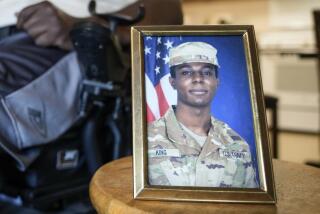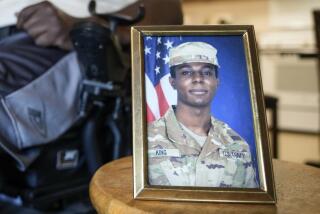Freed U.S. soldier is a deserter, some who served with him say
For nearly five years, Army Sgt. Bowe Bergdahl has been hailed as a hero: a prisoner of war captured while on combat duty in Afghanistan and held captive by the Taliban.
But in the days since Bergdahl’s high-profile release Saturday — celebrated as “a happy day” by Defense Secretary Chuck Hagel — an alternate narrative has emerged. In this version, now suggested by several fellow soldiers who were stationed with Bergdahl at Observation Post Mest in eastern Afghanistan, the 28-year-old Idaho native is not a hero but a deserter.
Bergdahl was not taken prisoner on patrol, as some of the early versions of his capture in June 2009 seemed to imply, but voluntarily left his unit, several of the former colleagues now say. They are demanding that Bergdahl be punished for what they say was his decision to abandon his post, in their view jeopardizing the lives of soldiers who had to go looking for him.
“He walked away from his duty as an American soldier — he deserted,” Joshua Cornelison, the platoon medic, said Monday. “People are calling him a hero, and that is absolutely wrong.”
Another platoon member, Evan Buetow, 27, said Bergdahl appeared to voluntarily leave the base and had spoken to fellow soldiers about “walking across the mountains on his own” or walking to India. They thought he was joking, Buetow said, “but then he ends up missing, and a light goes off.”
Army officials have said their interviews with the newly freed captive will enable them to determine with some certainty what happened. The Pentagon has always referred to Bergdahl as a prisoner of war, and Hagel did not directly answer questions about whether the Army sergeant had voluntarily left his post.
“Our first priority is assuring his well-being and his health and getting him reunited with his family. Other circumstances that may develop and questions, those will be dealt with later,” Hagel said.
Questions of how and why Bergdahl disappeared from the outpost have shadowed him during his five years in captivity, which ended when U.S. authorities negotiated a prisoner swap in which they agreed to free five Taliban commanders being held at the military detention center at Guantanamo Bay.
Now that he is free, members of his unit who obeyed orders not to discuss him have decided to tell what they know, Cornelison said.
The 30 soldiers of 2nd Platoon, Blackfoot Company regarded Bergdahl as an outsider, according to interviews with three former unit members and public postings and media statements by several others. He was quiet, reserved, unwilling to share the personal details other soldiers eagerly volunteered during endless hours of down time.
Bergdahl slept in a one-man tent at the observation post, a tiny patch of scrub in Paktika province, near the Pakistan border in eastern Afghanistan. He carried a notebook everywhere.
When the sergeant disappeared before dawn June 30, 2009, some of his platoon mates said they quickly suspected that he hadn’t been snatched from the outpost by the Taliban.
Bergdahl was “upset at the way the Army was handling the war effort in Afghanistan,’’ said Buetow, now a police officer in Washington state. “I told him we signed on the line, and this was our mission.”
Gerald Sutton, a former fellow platoon member who is now a college student in Michigan, said Bergdahl had expressed frustration with the Army and had casually wondered aloud before his disappearance what it would be like “to be left out on his own.”
Now, he’s convinced that Bergdahl abandoned his unit and, like several other former platoon members, is calling for the Army to hold him legally accountable.
“He’s a deserter — 100% — in every definition of the word,” Buetow said. “We want him to answer for that.”
Bergdahl could face a court-martial for desertion or for going absent without leave if the military determines there is sufficient evidence against him, said Eugene Fidell, who teaches military law at Yale Law School.
“We need to know more about his conduct during his period in enemy hands,” Fidell said.
The allegations of desertion have come on the heels of a heated political controversy over the Obama administration’s decision to trade the five Taliban prisoners for Bergdahl. Obama has been accused of caving in to Taliban demands and raising the ransom price for any future U.S. servicemen captured by insurgents — and failing to properly notify Congress of the Guantanamo releases.
The allegations put the Pentagon in the position of having to decide whether to punish Bergdahl if an investigation uncovers evidence that he indeed abandoned his post in combat.
The ambiguity surrounding Bergdahl’s release was underscored Saturday at Bagram air base in Afghanistan, when Hagel triumphantly announced: “This is a happy day. We got one of our own back.” He was greeted with near silence by U.S. troops.
Bergdahl, then 23, returned from a guard shift at the outpost the night he disappeared, Cornelison said. The medic went to bed after completing his own turn at watch but was awakened by his platoon leader, who asked him, “Doc, you seen Bergdahl?”
A search of Bergdahl’s tent turned up the sergeant’s rifle, helmet, armored vest, night-vision goggles and other gear, Cornelison said. Missing was Bergdahl’s notebook and, some soldiers said, his compass.
Fellow service members said Bergdahl had spoken of walking from Afghanistan to India. Cornelison, who now lives in Sacramento, said it was an offhand comment, with Bergdahl suggesting only that it might be an interesting endeavor some day, like sailing down the Nile River.
Cornelison said he believed Bergdahl shed his weapon and gear so that he could leave the post in the middle of the night without guards hearing him. When the platoon mounted a search of the area that morning, Cornelison said, they encountered a boy at a village school who said he had seen an American soldier crawling through the weeds nearby. The unit searched the area for hours, followed by countless searches of eastern Afghanistan in the coming weeks.
Radio intercepts, purportedly of conversations among insurgents and released by WikiLeaks from a trove of U.S. military documents, quoted them as saying that Bergdahl was captured unarmed while sitting on a makeshift latrine.
In 2012, Rolling Stone magazine quoted emails, never independently verified, that Bergdahl allegedly sent to his parents suggesting that he had become disillusioned with the U.S. effort in Afghanistan. The emails quoted him as saying he was “ashamed to be an American” and implied that he was considering desertion.
On Christmas Day 2009, the Taliban released a 36-minute video in which Bergdahl criticized the U.S. military effort in Afghanistan. “This is all going to be the next Vietnam, unless the American people stand up and stop all this nonsense,” Bergdahl said.
A spokesman for coalition forces, Rear Adm. Gregory Smith, said then that Bergdahl was clearly speaking under duress. Smith condemned the Taliban “for a horrible act that exploits a young soldier.”
Bergdahl’s parents, Robert and Jani Bergdahl, have not commented on allegations that their son deserted, though in a news conference Sunday in Boise, Idaho, Bergdahl’s father’s most visible emotion came when he referred to “the Afghan people” as he addressed his son in front of television cameras.
“I’m so proud of your cultural abilities to adapt, your language skills, your desire and your action to serve this country in a very difficult, long war,” he said. “But most of all, I’m proud of how much you wanted to help the Afghan people, and what you were willing to do to go to that length.”
In Bergdahl’s hometown of Hailey, Idaho, people were aware of the allegations of desertion Monday but were focused instead on celebrating his release and making plans to welcome him back. Mayor Fritz Haemmerle urged people not to “prejudge” Bergdahl.
“There’s a lot of controversy on the Internet,” said Adam Marks, 22, a hotel worker. “People are saying he’s a traitor and that he deserted his post. But everybody here is just happy he’s coming home.”
Bergdahl is undergoing medical and psychological evaluation at a U.S. military hospital in Landstuhl, Germany. He will soon be sent for long-term therapy at a military hospital in San Antonio, according to military officials.
Only then may all the questions be answered, his fellow soldiers say. Although Sutton said he wanted to see Bergdahl face a court-martial, he considered him a good soldier until he disappeared.
“I’d like to talk to the man and find out what was going on with him,” Sutton said. “I mean, he was my friend. I want to know.”
Times staff writers John M. Glionna in Hailey, Idaho, and Matt Pearce in Los Angeles contributed to this report.
More to Read
Start your day right
Sign up for Essential California for news, features and recommendations from the L.A. Times and beyond in your inbox six days a week.
You may occasionally receive promotional content from the Los Angeles Times.







